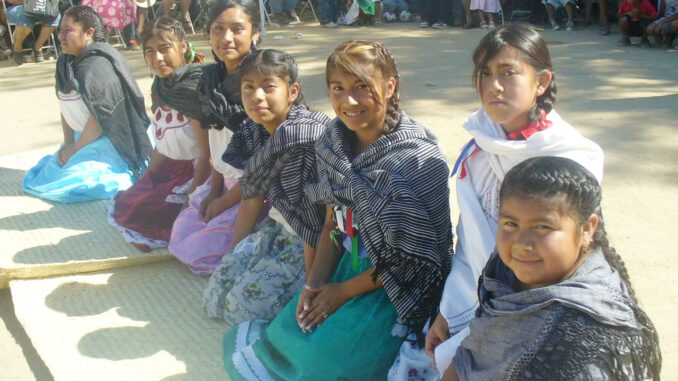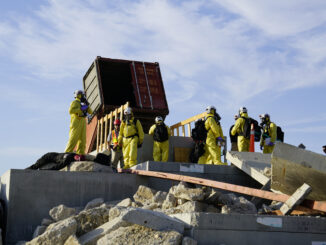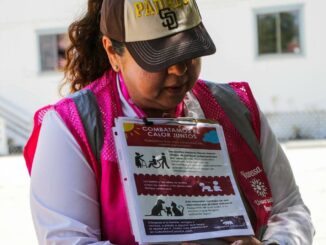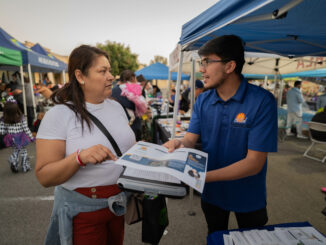
Filling the unmet needs of oral languages
by Andy Furillo
Turn around—don’t drown!” The National Weather Service coined this simple catchphrase as a warning not to cross flooded roads and risk the deadly danger of being swept away. In Spanish: “Retroceda, salve su vida.”
In either language, it’s a great message—short and effective. But what about those who don’t understand English or Spanish?
For speakers of Mixteco, or other indigenous languages of Mexico, failing to grasp the “turn around” message could be a matter of life and death. The same goes for messaging about any natural disaster—wildfire, earthquake, extreme heat—when indigenous communities need quick and reliable information they can understand about evacuations, shelters, and supplies.
Getting the word out is a core mission for Hector Hernandez, executive director of Unidad Popular Benito Juarez in California’s vast Central Valley. But how to get the word out to people with no written language?
“It was 9 or 10 at night when emergency evacuations were called in Tulare County—they were worried about the dam breaking,” Hernandez recalls. “What do you do in the middle of the night, when you know your indigenous communities can’t understand the warnings or the offers of help? Videos in the indigenous languages were one answer. We got the first ones published online in 72 hours.”
Today, disaster preparedness videos in a dozen languages and their variants are available at www.listoscalifornia.org. Listos California and Ready Reps are two programs of the California Governor’s Office of Emergency Services (Cal OES) that link community-based organizations and their communities with disaster preparedness resources. One such group is Unidad Popular.
For a quarter century, Unidad Popular has served the needs of indigenous immigrants living and working in the Central Valley. Hernandez, himself a native speaker of Mixteco, says the mission is challenging for a number of reasons.
“One issue is that the indigenous languages are so diverse and, due to migration, so spread out,” he says. “First we must identify which language someone speaks, and then which variant. I speak one variant of Mixteco, but there are 81 different variants.
“Another problem is that our community faces discrimination because of their language and culture, so they don’t voluntarily identify themselves as indigenous. This also makes them mistrustful about accepting help.”
Breaking through that mistrust is essential during a natural disaster. To illustrate why, Hernandez shares a story:
“On the outskirts of Tulare County, there is a little town called Tonyville with many Mixteco residents. In 2022, the area was hit hard by flooding. But Mixtecos weren’t following evacuation orders or going to shelters. Instead, despite the danger, they stayed in their houses. That was a big issue—people didn’t trust in the government entities.
“It turned out, when the floods first hit, FEMA put up a canopy in Tonyville advising people to ‘come here for help.’ Right next to it was a Homeland Security canopy. Our people thought they would be targeted by Homeland Security if they asked FEMA for help. So they stayed away.”
Beyond disaster preparedness, Unidad Popular guides its indigenous communities through the complexities of California’s courts, housing and schools. Another important focus is preserving their cultural heritage and traditions.
“We have a long reach in the Central Valley,” Hernandez says. “We’ve been doing this for 25 years. Our service is completely free, no strings attached. Our work is directly and intentionally for our community. We don’t have a particular issue we’re focused on. We’re flexible and go where the need is.”
For more information about Unidad Popular Benito Juarez, visit www.unidadpopular.org.
Flood Safety Tips
- Never drive into flooded areas. A foot of water will float many vehicles
- Don’t walk through moving water—as little as six inches of water can knock you down. Often you can’t tell how deep it is or what the water is hiding
- If trapped inside by floodwaters, move to higher floors or a roof, but not attics
- Always assume downed power lines are energized and dangerous
- Never drive around barricades. They direct traffic away from flooded areas or roads that are closed due to collapsed pavement or debris.
More tips on what to do in the case of all types of disasters can be found at www.listoscalifornia.org.




